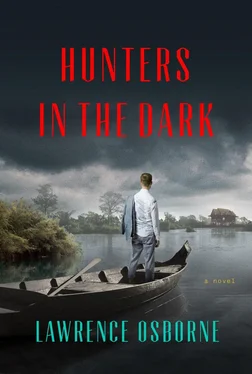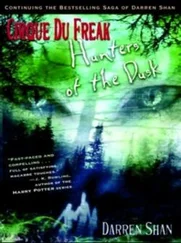“A friend recommended you to me,” Robert said, and he closed the door behind him.
The old man was in a collarless Viet shirt with a tape measure draped around his neck. A bamboo cloche hat hung on the wall behind him and there were paper chits all over the counter, seemingly in disorder. Vong asked him who his friend was.
“An American — I met him here.”
“I have a lot of Americans I make shirts for.”
“Well, I’d like a replica of this one — can you do it by tomorrow?”
Vong touched his mouth with his thumb and there was a sly irony in the air.
He said, “If you leave it here.”
“Well, I can’t leave it here.”
“All right, I will measure you up now.”
“Can you make it from linen like this one?”
“I got it.”
“If you measure me up can you do it by tomorrow?”
“I can do by three p.m.”
“Make it twelve and I’ll give you two bucks extra.”
“You’re in a hurry.”
“Yeah, I’m in a hurry.”
“What’s the hurry?”
“What does it matter to you?”
“A man in a hurry—”
“I lost my other shirts,” Robert blurted out.
“Lost them?”
“Yeah, I lost them. A drinking party.”
Vong laughed. “You jumped in the river?”
“Yeah, I jumped in the river. Can you do it?”
The tailor said he could and stepped out from behind the counter with the tape already extended.
“All right, good,” Robert said, and he felt, suddenly, the sweat pouring down his face and into his neck.
He held out his arms and Vong measured him.
“You’re not NGO,” the affable Vong bantered. “NGO don’t jump in the river and lose their shirts.”
“Sure they do.”
“But you’re not NGO. I wonder who your friend was. I might remember him.”
“His name was Simon. Tall and blond.”
Vong continued measuring, a pin between his lips. When he removed it, he said, “Don’t remember that one.”
“Never mind, I was just curious.”
“I make a hundred shirts a week.”
When the measurements were done they looked over the available linens. Robert picked out a pale green and a sand color. They came with mother-of-pearl buttons and trimmings. He went for soft collars and three buttons on the cuffs to make them look a little dressier.
The tailor stepped back and looked at the shirt he was wearing.
“One of mine,” he said immediately.
“I didn’t say it was one of yours.”
“I know my own shirts when I see them.”
“It was a gift.”
“From your friend?”
Robert realized now that he had made a mistake.
“Never mind. Shall I pay you up front?”
“That’s the way usually.”
Out came the thirty dollars.
“Thank you,” Vong said. “What about trousers?”
“I’m all right for trousers.”
“Your trousers look a bit beaten in. But they’re mine too.”
“Excuse me?”
“They’re my trousers too. No way I wouldn’t recognize my own trousers.”
Robert looked down helplessly at the trousers, which were indeed looking a bit beaten in.
“Maybe they are,” he stammered.
“Lose those too?”
“It’s a long story.”
“You seem to like Mr. Vong’s clothes!”
The tailor wasn’t really curious, he was more amused, and that kind of amusement could be brushed aside if Robert held his nerve and laughed along.
“But I like them so much I decided to get some more.”
“Good, good! So how about some trousers?”
Blackmail, then, Robert thought.
“All right, I’ll get one pair. Just like these.”
Vong measured him again and they picked out the very same material.
“They’ll look nice,” he said affably. “Twenty-five for you.”
It was more than Robert had wanted to spend but he had to let it go. His irritation burst out, however.
“Have those ready tomorrow as well. You may as well.”
“Yes, sir.”
Vong rolled up his tape.
Robert paid the extra twenty-five and Vong wrote him out a ticket for the three items.
“You want to have many Vong clothes,” he said. “Don’t be one of those barangs who look like homeless people.”
“I’ll try.”
“Everything will be ready tomorrow at noon. Is your friend Simon in town?”
They were at the door now and Vong had opened it and his body had moved into a small bow.
“I don’t know — why do you ask?”
“So you can tell him to come by and get some more shirts, of course.”
“I’ll tell him if I run into him.”
And then Robert’s curiosity returned and he asked Vong once again if he remembered the tall, blond American’s face.
“Not at all,” the tailor said. “But I might remember it by tomorrow. I might.”
“I hope you do,” Robert said.
His voice was dry and slightly hostile but he couldn’t help it. He felt victimized and he wanted to know where his predator was.
—
That night he went to Street 136 and ate on the outdoor terrace of a place called Okuncha. Salmon tartare salad and a cold Angkor. Sitting there he looked up at the first-floor balcony of the Candy Bar opposite, and the girls under the propeller fans looked down at him and smiled and cocked their heads like spaniels. What an easy life it was. Just moments randomly pieced together. Then he walked over to the Sorya and played pool by himself among the open-air bars. The rain swept in at about nine. For a long time he sat brooding close to the street and the puddles and the drunks with umbrellas and the white college boys dumbfounded by the easy sex and the way the middle-aged men didn’t move on their perches for hours. The bars were playing Psy that night and girls danced around the tables with quiet, spinning motions that were footsure and elegant and distant. He thought about Vong. It had clearly been a mistake to get involved with him and he cursed himself for his stupidity. Tailors are always shrewd. They are observers of men. Robert had bought some postcards in the supermarket and now he wrote one to his parents and one to Yula. He wrote that he was having a good time and that nothing was out of the ordinary. The phrases were trite and typical of the things he wrote home. It might be the last thing he wrote to them in a long time, and he wondered if he could rise above the clichés he had scribbled. But the less dramatic he was, the less they would feel suspicious or become alarmed. His parents would shrug and criticize his irresponsibility, but Yula was the tricky one. She would pore over every word for hidden meanings. She was already suspicious, he could sense it even from a distance of five thousand miles. They had no commitment to each other now, but she would be hurt by his silence.
He wondered if he should send either postcard after all. He finished them anyway, then put them in his pocket and thought it over. Perhaps not, then. Disappearance ought to be an event that is thought through carefully. One ought to take it seriously. It couldn’t be undone flippantly, and in any case he didn’t want to undo it. Surely she had known how miserable he had been when she knew him. It wasn’t her fault, but then it wasn’t his either, and in his mind it was only a temporary situation. He might be gone for a year, or two, or three, and then he would see.
He lit a bitter Alain Delon and got a one-dollar rum and Coke. Things disappeared in any case for different reasons. One day, not long ago, he had given to his class of thirteen-year-olds a copy of the famous daguerreotype of the Boulevard du Temple in Paris taken in the year 1839. He asked them to write an essay on the theme “Why is the street in this photograph empty?” It was the kind of thing they relished. But none of them got the right answer. The street was not empty because in those days there were very few vehicles and very few people and very few pigeons. Paris in 1839 was not empty. One could clearly see the awnings of busy shops and cafés. It was just that the exposure time had been about ten minutes, and thus nothing moving within that window of time had left a trace for the ages. There was just the ghostly silhouette of an unknown man having his boots polished by another man, at the corner of the cobbled Boulevard du Temple. It took more than ten minutes to shine a pair of boots in those days and he told them that he often wondered who that man was — the Frenchman with the thin, manly leg raised upon a shoe polisher’s stool.
Читать дальше












